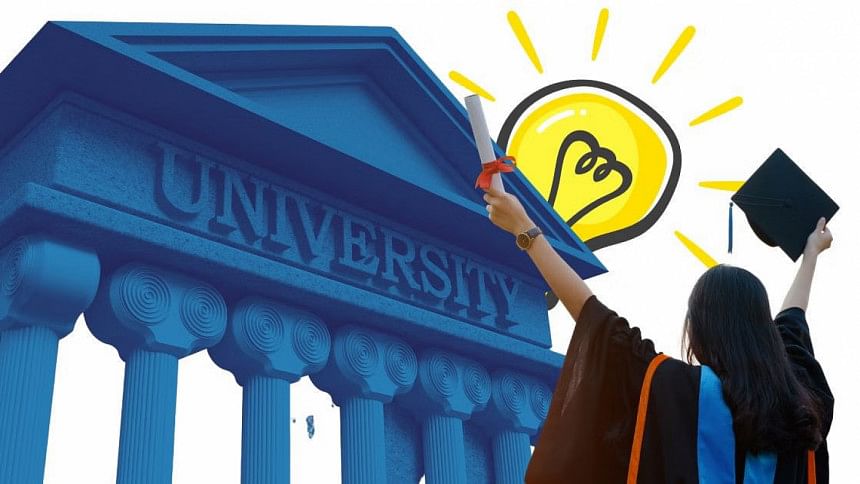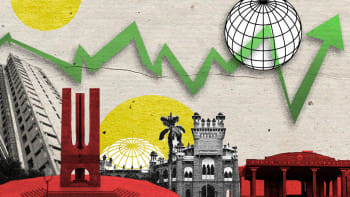Our outdated, inefficient higher education institutions

Bangladesh's higher education is marred by several key but ignored issues, for which our higher education institutions (HEIs) can neither promote people as "producers of knowledge" nor as "skills developers." Amid this situation, the advent of the fourth industrial revolution (4IR) demands urgent measures to change this situation.
The world has never witnessed such unprecedented human-to-technology interactions. Not only industrialised countries, developing and underdeveloped countries are also recognising the importance of using hi-tech gadgets in work life. The application of AI-enabled machines, internet of things, big data analytics, and virtual reality continues to transform businesses.
The features of 4IR lead us to pose one question: what should the skills, knowledge, and innovation be like in this revolution? To meet the demands of this new era, countries worldwide are developing and implementing economic and industrial initiatives. Some examples include Germany's Industry 4.0 and the US's Advanced Manufacturing Partnership, both launched in 2011, and Japan's Society 5.0 and China Made in China 2025, both initiated in 2015.
Before Bangladesh takes any steps towards innovation in line with the revolution, it is crucial to have a clear understanding of global initiatives. In addition, it is important to critically evaluate the role of HEIs in these endeavours. Collaboration with other countries may also be necessary to achieve this goal.
Unfortunately, the HEIs' response to 4IR is slow and requires a significant realignment. For instance, most research is conducted out of personal interest or self-promotion by individual faculty members, not to solve industrial problems or meet societal needs. This conclusion is based on my decades-long experience of working at a reputed Bangladeshi public university and serving two terms as vice chancellor at a well-known private university.
A shift in workplaces—in terms of knowledge, skills, and competencies due to the revolution—now requires all educational providers to redesign their curricula, move away from theories, and be more workplace skills-based to prepare graduates for 4IR job requirements. With the rate at which technological development and advancement takes place, it would be profitable for HEIs to have a strong link with employers to know how to respond to workplace needs. Failing to have such links means failing to prepare graduates for jobs available in the market.
Traditionally, HEIs in Bangladesh have primarily focused on knowledge dissemination through conventional teaching methods, which have not prioritised higher cognitive skills and transformative learning. The institutions must prioritise developing both technical and soft skills. Both technical skills—such as subject knowledge, critical and logical thinking, and complex problem solving—and soft skills—such as professional ethics, understanding of diversity, and self-awareness—are important to equip students with the necessary capabilities to thrive in their jobs.
Meanwhile, education researchers have conducted extensive research on teaching and learning methods, and it is essential for faculty members to familiarise themselves with these practices and apply them appropriately to their courses. If needed, HEIs should provide training to ensure the effective implementation of these practices.
The division between students of STEM, humanities, and social sciences should be dissolved. A higher education system in which subjects such as mathematics, data science, programming, languages, philosophy, and ethics are basic requirements for every student should be developed. This will help students develop a holistic understanding of the world and equip them with necessary skills to excel in 4IR workplaces.
Two matters require attention: harmonisation of curricula for global competence, and research based on societal needs. While developing curricula, it is important to take into consideration both national and international demands. In this way, graduates will be prepared for both national and international employment. Due to curriculum differences, attempts to establish memorandums with overseas universities failed when I was vice chancellor. The Bangladesh government urgently needs to develop an "Industry 4.0" policy, and HEIs must align their research with societal needs and policy guidelines.
It is essential for HEIs to have a proper understanding of the fourth industrial revolution, as it will help them tackle challenges related to curriculum and skills development, research, and teaching. The fact is that every country has its own standards for education, which obviously differ from those of other countries. As the world is interconnected, collaboration within the various higher education systems is of utmost importance to achieve excellence. Additionally, cooperation between HEIs, the corporate sector, the government, and economists is essential to building a wealthy and smart Bangladesh.
MM Shahidul Hassan is former professor of the Department of EEE at Bangladesh University of Engineering and Technology (Buet). Email: [email protected]
Views expressed in this article are the author's own.
Follow The Daily Star Opinion on Facebook for the latest opinions, commentaries and analyses by experts and professionals. To contribute your article or letter to The Daily Star Opinion, see our guidelines for submission.

 For all latest news, follow The Daily Star's Google News channel.
For all latest news, follow The Daily Star's Google News channel. 











Comments